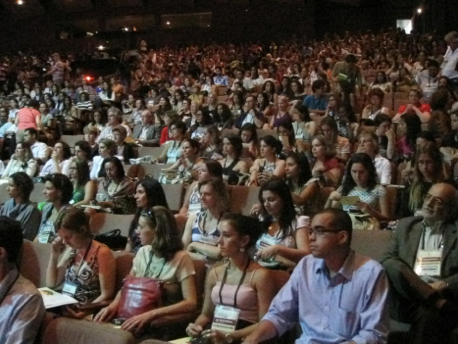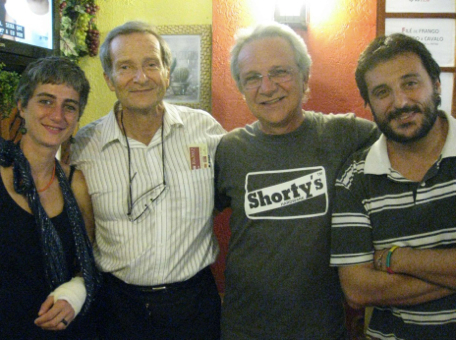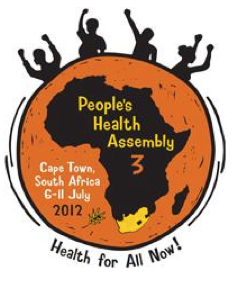July blog
Claudio Schuftan

Los Angeles. My purpose this month is to energise all you readers, especially Association members, after the good progress made in our Rio conference at the end of April. I endorse other contributions to our website and to World Nutrition that are stating: Rio2012: What next; with no question mark. So I should rather say that my aim is to keep us energised.
Rio2012: What next
MOVING FORWARD AND KEEPING ENGAGED
I dedicate this column to everybody who participated in the conference, just a few of whom are seen above (with plenary speaker Renato Maluf, the Brazilian sociologist, at the far right) Those few empty seats at the front were soon filled! We must not leave the many good discussions, proposals and recommendations coming from Rio hanging in the air. (This, I should perhaps now say, is our conference at the end of April, not the UN Rio+20 environmental conference). Expectations have clearly been raised.
The Rio Declaration: a good start
Last month, WN published the introduction to the Rio2012 Declaration. It includes good statements. For example: 'Public policy must be made in the public interest. Policy concerning public health and public goods is soundly based only when it is the product of discussion and agreement in which claim-holders are equal participants with duty-bearers. Protection and maintenance of public health, including nutrition, is one of the prime duties of governments along with other actors. Governments must gain, retain or recover the capacity to supply high-quality public services and to regulate all relevant actions that impact on public health…' and so on.
Many of us think this was a good start, but which all needs to be made more specific now and complemented with the wealth of key points picked up by our rapporteurs in the 40 or so different sessions. [Editor: this process is happening now] I value this for a different reason too. As with most conferences, when I sit down at the start and mark my programme, there are some times that I find I want to engage with four parallel sessions going on in the same period of the day, and at other periods there are whole stretches where there is nothing that wants me to be there. What's the answer? Perhaps it is to make sure that the organiser of the programme is a special buddy! More realistically, I suppose, I could broaden my line of interests...
A charter
In one of the most memorable plenaries, Walter Willett proposed that the Association (aka the WPHNA) should draft a charter delineating what we stand for. I think his proposal has merit. Some of what ought to go into such a charter is included below. In the same line, David Sanders gave us some 'what to dos'. These include:
• Nutrition to be much more oriented towards and based on communities
• The food and drink industries and 'the market' generally to be regulated
• Agriculture to be community-based (this also addresses climate change)
• The causes of obesity to be addressed by firm official policies
• The macroeconomic causes of malnutrition to be actively addressed
• Social mobilisation on these and all other key relevant issues.
At Rio2012 there were also many calls for convergence between the biomedical and the social and other dimensions of nutrition. This too is indicated in the Rio2012 Declaration introduction. It starts: 'Public health nutrition is both political and technical. Its dimensions are social, economic and environmental, as well as biological and behavioural. It incorporates the underlying and structural causes as well as the immediate causes of disease, health and well-being. The guiding structure of the Rio2012 congress has been knowledge-policy-action. This makes clear that public health nutrition is a central part of the public health movement with lead responsibility in its areas of special knowledge'.
But the convergence needed is not just of disciplines or areas. It also needs to be of the various value systems that need to be incorporated into public health nutrition. And yes, I do include here the set of principles concerning human rights. Rio2012 was just a start, but judging from the energy of applause from conference participants when a number of us brought this up in sessions during the time for interventions and contributions from the floor, such a shift of the underlying values and general ethos in our profession was backed by many. Maybe by a majority.
Hot topics
The programme committee responsible for Rio2012 deserves much congratulation. Many big issues normally not on the programme of nutrition conferences were exposed and discussed at length, and some sessions were truly innovative. What follows in this section is my opinion, and that of the People's Health Movement (PHM) and allied global civil society organisations.
Public-private partnerships, and the Scaling Up Nutrition Initiative, both on the Rio2012 programme, were high in our agenda. And we said what needed to be said… from the floor though since none of us was invited to present about these two key topics. But that is OK. My fellow campaigners and I have been back-benchers almost all our professional lives, and the back-bench can be vocal….and strong, if needed.
The hot topic of public-private partnerships was much discussed at Rio2012. And rightly so since public health professionals are also committed to the protection of the public interest and of public goods. We stand for corporate accountability beyond corporate responsibility. The idea of partnerships between public and private bodies sounds good and right, but in practice, is it? The People's Health Movement sees public-private partnerships as a powerful way to create space for corporations to influence and shape public policies and practices. In this respect, they magnify the influence of individual corporations and trade associations. Should this concern us? PHM thinks so. Does this whole issue need more ventilation, after Rio2012? I think so.
Now, some more about Scaling Up Nutrition, on which so many hopes of so many organisations are pinned. The powerful actors in our field are all for (or basically for) SUN, as the highest geared and most impressive international initiative ever designed to combat malnutrition. Their logos are printed in the SUN Framework for Action. I mentioned in my column last month, in Rio2012 it was confirmed that the Roadmap II for SUN will soon be up for discussion and we were welcome to participate in its formulation. Box 1 below gives a glimpse of the concerns voiced by PHM and other global civil society organisations represented at the conference.
Box 1
For whom is SUN rising?
Many of us believe that the leaders and the teams engaged with the Scaling Up Nutrition initiative, and the claim holders and duty bearers liable to be most affected one way or another, need now to do some hard thinking.
In the People's Health Movement, and associated global organisations, we believe that any initiative such as SUN designed to reduce malnutrition, must strengthen local people's self-determination, as well as strengthening traditional and long-established food systems and supplies so as to protect and even re-create appropriate and genuinely sustainable dietary patterns. We thus speak of food sovereignty and not merely food security. We believe that all interventions should be based on the human rights principles of disparity reduction, accountability, participation, non-discrimination, and equality of opportunities and of results. We also believe that interventions should be an integral part of declared and operated national strategies designed ultimately to realise the right to nutrition. The upcoming SUN Roadmap 2 must say this.
Are we being 'ideological'? Indeed we are. While SUN as now formulated) says it will increase local independence and autonomy, it all is very 'top-down'. Engagement with existing international public interest civil society organisations would help SUN to gain the legitimacy it does not have right now.
If there is sound evidence that the populations of impoverished countries and communities are really being supported by SUN to become more strong and independent, many more will be inclined to cheer and even lend a hand. But this depends also on the SUN Initiative requiring full transparency, disclosure and accountability from its sponsors and partners in the private sector.
Rio2012: What next
TACKLING THE BIG ISSUES
I believe it would be great if our Association actively prepared to tackle some of the biggest issues confronting us as a profession – and also as citizens. The relationship between national governments and international industry is just one of these. Could the Association focus on some of the most pressing themes we heard keenly being discussed in Rio2012, from the platforms and from the floors, and in working group meetings? I look forward to knowing what the key points and recommendations from all the sessions, to be added to the Declaration, will be. Then all of you as readers need to react and consider the implications this will have for action in the immediate future.
At the conference, speakers frequently called for the Association to gain more authority and influence, so as to gain greater access to the international organisations in which public policies are made, as well as to the venues where this work is done. Does the Association have that collective will? Can this be achieved? There were some high hopes for this expressed. Finally it was often indicated that the Association as a body, should have a defined role as a watchdog of actual nutrition policy making and implementation. Criticism is due here. Why are we not yet as an organisation or profession influencing public policy to the degree we should? What is missing? I ask. Now it is your turn to speak out. That is why the response box is placed at the end of this column.
Rio2012:
THE LIGHTER SIDE OF PROFESSIONAL LIFE

Now on the lighter side. Conferences are special times to meet and spend time with colleagues, especially those who are friends and comrades – including sometimes people we know well, but up to then only virtually. Here I am above (in the shirt) with three special friends from the PHM in Italy. Yes, you have seen these smiles before!
Sometimes we make plans in advance to spend quality time with good friends. It is sad though when meeting them is the most you get out of the meeting overall. And there is the opposite feeling, of leaving the conference knowing you did not have enough of that quality time with them, or even worse, you hate yourself because you did not discuss special topics A, B, C or X with them – how could you be so forgetful! (I think we are getting older and things just slip our minds. The poster I have in my office says it all. 'The older I get, the better I was'.
Rio2012 was no exception. I did see many buddies, some more, some less. Rainy weather helped. Yes, I also have to tell you that we eventually ran out of time to fix all the problems of public health nutrition. But we had some good times, good caipirinhas and some good talks --many about conference topics where we agreed on common approaches to be made in different sessions. Meeting your buddies is also a way to become more collective and therefore stronger.
People's Health Assembly
Off to the Western Cape now

As I complete this column I am packing to go to South Africa, to the Third Assembly of the People's Health Movement. Here above is the badge of the meeting. You can read all about the Assembly at http://www.phmovement.org.en/pha3.
The People's Health Assembly, like the World Social Forum, is for and by people, rather than an international event organised by global structures. It includes civil society organisations and networks, social movements, academia, and other actors from around the globe. It provides space for strengthening solidarity, sharing experiences, mutual learning and joint strategising for future actions.
The first Assembly was held in Savar, Bangladesh in 2000. with more than 1,500 participants. The People's Charter for Health the PHM founding document, was developed and endorsed at this Assembly. The second Assembly was held in Cuenca, Ecuador in 2005, also with 1,500 participants. The Cuenca Declaration, issued at its conclusion, provides a strategic vision for the PHM. We expect 1,000 participants at this third Assembly being held in South Africa at the University of the Western Cape. More next month.
Acknowledgement and request
You are invited please to respond, comment, disagree, as you wish. Please use the response facility below. You are free to make use of the material in this column, provided you acknowledge the Association, and me please, and cite the Association’s website.
Please cite as: : Schuftan C. Rio2012: What next. Moving forward and keeping engaged. [Column] Website of the World Public Health Nutrition Association, July 2012. Obtainable at www.wphna.org
This column is reviewed by Geoffrey Cannon.
The opinions expressed in all contributions to the website of the World Public Health Nutrition Association (the Association) and to World Nutrition, are those of their authors. They should not be taken to be the view or policy of the Association, or of any of its affiliated or associated bodies, unless this is explicitly stated.
cschuftan@phmovement.org
www.phmovement.org
www.humaninfo.org/aviva






